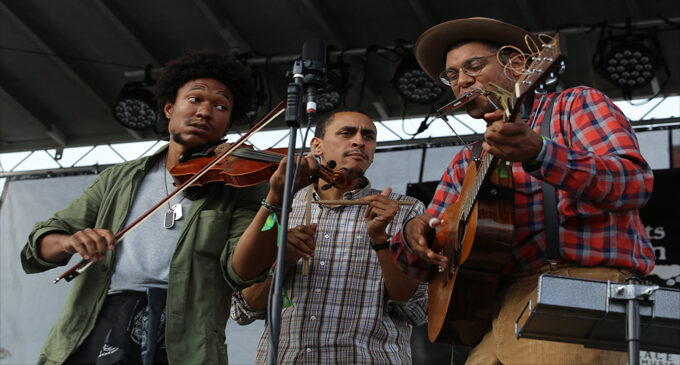African American roots are deep in traditional music
Dom Flemons (on guitar) with Brian Farrow, Tarek Mohammed and Dom Flemons at 2010 Rhythm and Roots Reunion, Bristol, Tennessee.

By David Winship
Music, like leaves on a tree, draws strength and sustenance from the branches, trunk, and ultimately, the roots from whence it springs. The roots of American traditional music, whether old-time, bluegrass, or Americana, stem from their connections to Africa, as well as northern Europe. The tunes, influences, and place of the banjo, with its origins in Africa, and its heritage with enslaved populations of the South and their descendants, have begun to be reclaimed. Additionally, the blues music of the Mississippi Delta and Piedmont regions provide an important soundtrack to roots music.
The songs of the blues, including the fields, the trains, and the prisons, provide foundations and groundwork for traditional songs now being revived and reinterpreted. These influences in recordings made in the twentieth century have found receptive respondents in musicians of the twenty-first century.
From the early days of recorded music, Black artists have been important and influential singers, song writers, and musicians. If it were not for Lesley Riddle, we would not have had the tunes to go along with the song collection of A. P. Carter and The Carter Family. If it had not been for Black Mississippi blues singers of the railroads, we would not have had the singing style of Jimmie Rodgers. If we did not have the influence of Arnold Schultz, we would not have had the sound of Bill Monroe and the beginnings of bluegrass music.
Had it not been for traditional Piedmont musicians like Joe Thompson, we would not have had the Carolina Chocolate Drops. If it had not been for Carl Martin, Ted Bogan, and Howard Armstrong, the heritage of Black string band musicians would have not continued through the folk era of the 1960s. If not for Elizabeth Cotton, we would not have had “Freight Train” nor Dale Jett carrying on the family tradition of The Carter Family, because she showed him how to play left-handed.
These influences are bearing fruit in the twenty-first century. Perhaps most notable, though by no means only, of the strong, powerful and talented African American musicians are those who emerged from the Black Banjo Gathering in 2005 at Appalachian State University. The Carolina Chocolate Drops grew from that gathering, which was the first meeting of Rhiannon Giddens, Dom Flemons, and Justin Robinson.
Dom Flemons has carried forth spreading traditional music interpretations as “The American Songster,” releasing albums, winning awards and educating the public of the rich and influential history of African Americans, such as his record, “Black Cowboys.” His music reflects old-time music, including the originals of Black banjo music from the Carolinas, like Sid Hemphill, Henry Thomas, and Peg Leg Howell.
Rhiannon Giddens has pioneered multiple avenues since her days with the Carolina Chocolate Drops. Among them are the awarded “Songs of Our Native Daughters,” a collaborative effort of banjo-picking women including former Chocolate Drop Layla McCalla, Allison Russell, and Amythyst Kiah. The album explores and highlights the lives and legacies of their Black experience. Russell has recently released her first solo album, “Outside Child,” which has received three Grammy nominations this year. Kiah’s 2021 album “Wary + Strange,” is a clash between her old-time/roots music and her early-influenced alt-rock. It includes her award-winning “Black Myself,” a song which Billboard Magazine described as “Blistering … A must-listen about living in the land of white privilege.”
Tray Wellington is a contemporary banjo player who received the International Bluegrass Music Association’s 2019 Momentum Instrumentalist Award, as well as the Momentum Band as a member of Cane Mill Road. Along with fronting the Tray Wellington Band, he has recently begun his career as communications manager for Pinecone, the Piedmont Council of Traditional Music.
Black roots run deep in the fertile soil of American traditional music. The seeds of the heritage of the musicians who have come before are harvested in the new young musicians who are nurturing the music, expanding audiences, developing their own sounds, and providing enrichment, education, and entertainment for the world.
To learn more, visit www.birthplaceofcountrymusic.org.
David Bonner Winship is a member of Winston-Salem Writers, a resident of Bristol, Tennessee, and works with the Birthplace of Country Music Museum in Bristol, Virginia, on educational projects. He is the host of the weekly show Vinyl Reflections on Emory & Henry College radio station WEHCFM.com, where he features songs from among the hundreds of vinyl albums in his collection. Reach him at dbwinship@gmail.com.











